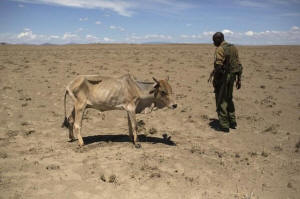|
Kenya close to ending drought crises,
says local scientist award winner
 Send a link to a friend
Send a link to a friend
 [August 30, 2016]
By Katy Migiro [August 30, 2016]
By Katy Migiro
NAIROBI (Thomson Reuters Foundation) -
Kenya is on its way to breaking the devastating cycle of drought,
poverty and hunger over the next decade, a leading scientist said as he
was named winner of a prestigious award.
Kenyan scientist Andrew Mude won the 2016 Norman Borlaug Award for Field
Research and Application on Tuesday for developing livestock insurance,
using state-of-the-art technologies, for herders in East Africa's
drylands.
"I am confident that with insurance and the related complementary
services, the boom and bust cycle will come to an end," said Mude,
principal economist at the Nairobi-based International Livestock
Research Institute (ILRI).
"The boom and bust cycle and particularly its consequence of famine ...
is reducing and will reduce relatively rapidly in the course of the
coming decade," the 39-year-old told the Thomson Reuters Foundation in a
phone interview.
Droughts regularly decimate herds across Africa, forcing destitute
families to abandon their nomadic lifestyle and settle in remote, dusty
towns where they fall deeper into poverty.
Over 16,000 Kenyan households have already benefited from ILRI's
index-based insurance scheme, which provides herders with a payout when
rains fail, rather than waiting for animals to die, Mude said.
Compensation is calculated using satellite images to compare current
forage levels with historical data.

"When a drought hits, you minimize the impact," Mude said, likening the
scheme to health insurance.
"Households can use the indemnities to try and protect livestock from
dying."
There are more than 50 million herders across Africa and many of them
could benefit from the technology, according to a statement by the World
Food Prize, which was created by Borlaug - famous for developing wheat
varieties that drove the Green Revolution in the last half of the 20th
century.
Eliminating hunger by 2030 is one of 17 ambitious Sustainable
Development Goals (SDGs) agreed last year by U.N. member states to
tackle the world's most troubling problems.
LA NINA
Since its launch in Kenya in 2010, livestock insurance has also been
rolled out in Ethiopia, with plans to test similar schemes in west and
southern Africa, the statement said.
Kenya's government lent its support to the project in October, following
up on a 2013 election pledge to provide national livestock insurance.
From thinking pastoralism was a "dying and inefficient" production
system, government now sees it as well suited to the challenges of the
arid lands, Mude said.
The government is paying premiums of eight percent to 12 percent for
5,000 households in northern Kenya, each with livestock worth around
$700, Mude said.
[to top of second column] |

A Kenyan soldier from the Rapid Deployment Unit, an emergency
response unit who were deployed due to reoccurring clashes and
killings between Turkana and Dhaasanac communities, looks at a cow
which is dying from hunger, a few hundred meters from the official
boundary of the Kenya-Ethiopia border in northwestern Kenya October
13, 2013. REUTERS/Siegfried Modola

Some 1.2 million Kenyans need food aid due to poor spring rains
associated with the El Nino weather phenomenon, the Famine Early
Warning Systems Network (FEWSNET) said.
The situation is likely to worsen as La Nina is predicted to bring
poor October to December rains, it said.
El Nino occurs when water in the Pacific Ocean becomes abnormally
warm, while La Nina involves unusually cold waters.
Almost 300 herders in the drought-hit north received some $120 each
in insurance payouts last Wednesday, Mude said.
"We're now planning to replicate this novel insurance scheme across
all of northern Kenya, where some four million pastoralists depend
primarily on livestock," Kenya's cabinet secretary for agriculture,
livestock and fisheries, Willy Bett, said in the statement.
Households using insurance are less likely to sell off their
livestock in distress when prices are low during droughts, or to
reduce the nutritional intake of children aged below five, and
report a greater sense of wellbeing, Mude said.
With improved access to roads, mobile phone networks and banking
services, herders are starting to develop businesses to "build
themselves out of poverty", he said.
The award, named after the 1970 Nobel Peace Prize winner, recognizes
science-based achievements in the fight to end global hunger and
poverty.

(Reporting by Katy Migiro; Editing by Katie Nguyen.; Please credit
the Thomson Reuters Foundation, the charitable arm of Thomson
Reuters, that covers humanitarian news, women’s rights, trafficking,
property rights and climate change. Visit http://news.trust.org to
see more stories.)
[© 2016 Thomson Reuters. All rights
reserved.]
Copyright 2016 Reuters. All rights reserved. This material may not be published,
broadcast, rewritten or redistributed. |